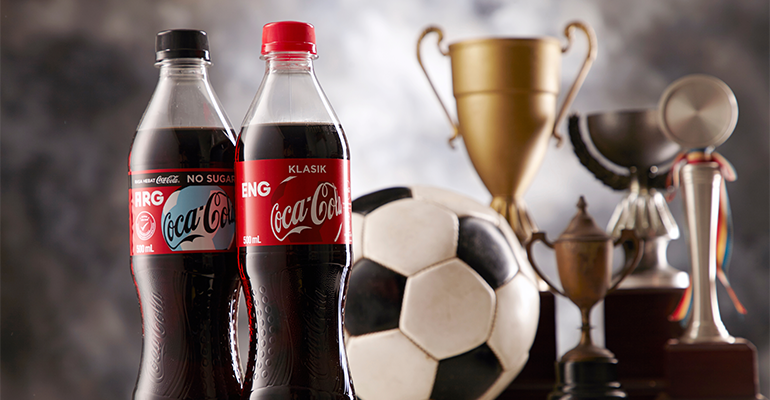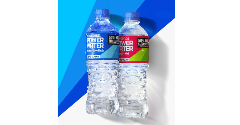News
Coca-Cola accused of ‘sportswashing’ amid FIFA sponsorship storm
30 Jun 2025Doctors and health campaigners are calling for football's governing body, FIFA, to drop Coca-Cola as a 2025 Club World Cup sponsor, accusing the multinational of “sportswashing”.
Dr Chris van Tulleken, of University College London Hospital, and Professor Carlos Monteiro, from the University of São Paulo, said Coca-Cola and other sugary drinks companies have “exploited the world's most popular sport for commercial gain… profiting off players and fans while contributing to a global health crisis”.

In a BMJ article entitled “Football can’t ignore its sugar problem”, published as the 2025 Club World Cup kicked off in the US, they wrote: “By embedding itself in football and other beloved sports, Coca-Cola isn’t just sponsoring the game; it’s normalising excessive sugar consumption, contradicting the principles of fitness and health that sport represents.”
The pair argued that FIFA, as the global ambassador and governing body of football, has allowed Coca-Cola to “sportswash away the negative health effects of its product by linking it with athletic achievement and sportsmanship”.
FIFA sponsorship has ‘cemented’ sugary drinks ‘into public consciousness’
As FIFA’s official sponsor since 1978, Coca-Cola has leveraged its high-profile platform to promote sugary drinks to billions, the experts wrote, and this “in spite of the demonstrable link between sugary drinks and type 2 diabetes, dental caries, obesity and many other negative health outcomes”.
During the World Cup in Qatar in 2022, more than five billion people were exposed to Coca-Cola, they argued, with the drink ubiquitous – on big screens, on advertising boards, and in front of players during press conferences (which moved some stars to take action).
This sponsorship of the world’s most popular sport has “cemented [Coca-Cola’s] sugary drinks into the public consciousness”, wrote Monteiro and van Tulleken.
“We need to hold these corporate giants to account for putting profits ahead of public and planetary health,” they added.
Children ‘particularly susceptible’ to sugary drinks sponsorships
Most concerning for health experts is the appeal of the sugary drink sponsorships to children.
Indeed, research over many years has showed that food and beverage products associated with sports generate positive feelings, excitement, and a positive self-image among adults and children.
They “are particularly susceptible to the allure of sugary drinks and their pervasive marketing”, the experts wrote, adding: “We can’t ignore the irrefutable link between sugary drink consumption and poor health.”
Looking ahead to next year’s World Cup, the doctors joined others in the Kick Big Soda Out of Sport campaign. Led by global health organisations and advocates, the initiative has garnered widespread support and publicity, with more than 255,000 petition signatories and 93 organisations calling on the International Olympic Committee (IOC) to end its nearly 100-year partnership with Coca-Cola.
The IOC has previously said how “incredibly proud” it is of the partnership with Coca-Cola. The drinks company has pointed to its sugar-free drinks options.
“From an IOC perspective, Coke is taking a responsible approach to supporting athletes’ families, fans and is taking an integral part in the delivery of the Games,” said Anne-Sophie Voumard, the IOC’s television and marketing services managing director, last year.
The deal signed with Coca-Cola in 2020, and running to at least 2032, is worth a reported $3 billion, according to Fortune.
Badge of dishonour?
The deals between some of the most popular sports’ governing bodies and food and drink giants are not being scrutinised enough, nor critiqued by the media, according to research published in May.
The international health organisation Vital Strategies assessed the content in 85 media articles, finding that “short, general articles without critical analysis” dominated the coverage of Coca-Cola’s sponsorship of the 2024 Paris Olympics.
Most (78%) of the 85 articles assessed framed Coca-Cola’s involvement in a favourable light; just 14% critiqued the deal. The articles reached an estimated 1.02 billion readers – the equivalent of spending $9.41 million on advertising.
FIFA is promoting a product linked to rising rates of obesity, type 2 diabetes, and heart disease, said Trish Cotter from Vital Strategies.
Support for the IOC and FIFA to take decisive action to end the widespread marketing and sponsorship of unhealthy food and beverage companies is snowballing, said experts.
Related news

Oat Barista: Innovation for game-changing beverages
20 Nov 2025
Oat Barista is a clean label, sustainable, and innovative drink base specifically designed to create the perfect foam in one single ingredient.
Read more
How younger consumers are redefining ingredient choices and rejecting brand loyalty
18 Nov 2025
Gen Z and millennial consumers’ preferences for transparency, functionality, and purpose are “redefining the very nature of consumption itself”, says SPINS.
Read more
Hybrid formats and flexible positioning to disrupt category norms in 2026
17 Nov 2025
Trend forecasters expect food and drink to move more fluidly across occasions, functions, and formats as consumers seek versatility, novelty, and convenience.
Read more
Danone highlights digestive health as potential ‘tipping point’ for food industry
13 Nov 2025
Danone is betting on a food industry “tipping point” that will bloat the market for healthy products, particularly those related to gut health.
Read more
New UPF standard hoped to offer consumers ‘coherence and clarity’
10 Nov 2025
Ingredients companies are being urged to enter “a new era of partnership and innovation” following the launch of the industry’s first non-UPF verification scheme.
Read more
Faravelli at Fi Europe: Showcasing FARA® functional solutions for food and nutra
28 Oct 2025
At Fi Europe 2025 in Paris (stand 72M39), Faravelli showcases FARA® Customized Functional Solutions and a wide ingredient portfolio for food and nutra – delivering quality, innovation, and expertise.
Read more
Agrigum Redefined FIBER
27 Oct 2025
Agrigum has transformed gum acacia into a natural, science-backed fibre that supports gut health, sustainability, and innovation across global food and nutrition applications.
Read more
Expanding boundaries in food & beverage innovation
23 Oct 2025
IMCD and FrieslandCampina Professional expand partnership to deliver Kievit® across EMEA, enabling brands to enhance quality and accelerate time-to-market for tomorrow’s food & beverage creations.
Read more
Amazon Grocery launch aims to balance quality with affordability
22 Oct 2025
Global e-commerce giant Amazon has introduced a new private-label food brand, combining existing Amazon Fresh and Happy Belly products with new everyday items.
Read more
Powerade enters hydration space with launch of Power Water
21 Oct 2025
Coca-Cola’s Powerade brand has launched a zero-sugar, electrolyte-enhanced functional water, marking the brand's entry into the hydration space.
Read more